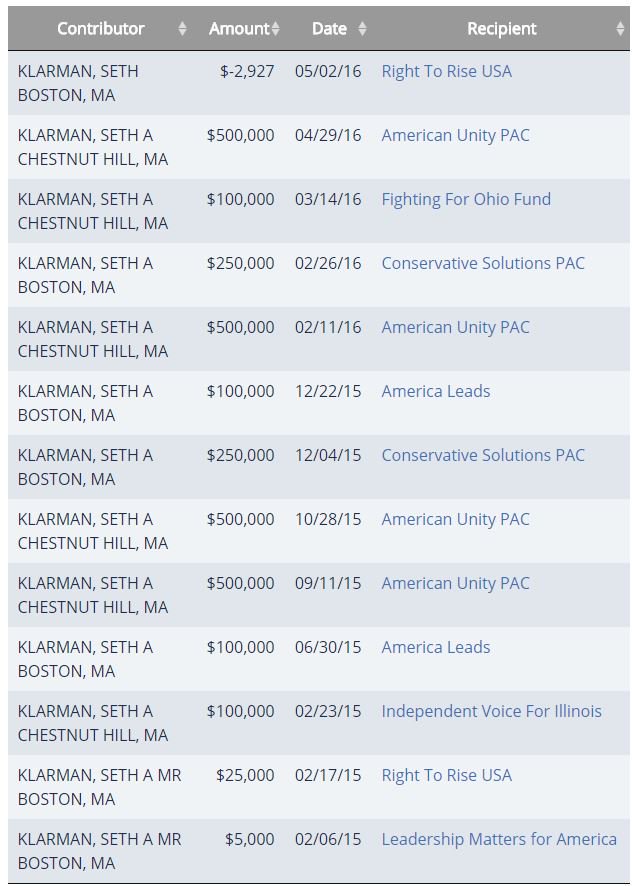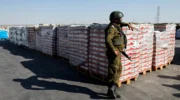Puerto Rico has suffered under a borrowing crisis in which creditors scooped up bonds on the cheap and then procured an astronomical payout. This has led to widespread suffering. Seth Klarman, whose hedge fund has one of the largest holdings of Puerto Rican debt, has donated through the years to numerous Israel lobby groups that enable Palestinian suffering.
David Dayen reports in the The Intercept that Boston hedge fund billionaire Seth Klarman is the owner of one of the largest holdings of Puerto Rican debts (read full article below). This has been kept secret until now.
Dayen explains that Puerto Rico “has been mired in a borrowing crisis for years… Many [creditors] scooped up bonds on the cheap, seeking an astronomical payout by forcing the island to pay them back at par (or 100 cents on the dollar). This has led to widespread suffering.”
Klarman is widely known to use his wealth to support Israel causes.
He’s on on the board of advisors and a major donor to the Israel Project, which says it is “dedicated to changing people’s minds about Israel through cutting-edge strategic communications. We don’t attack the media, we become a trusted partner and resource – bringing integrity and facts to the coverage using proven strategies like building relationships, testing messages and giving journalists everything they need to get the story right.” (Donating to this is tax deductible in the U.S., though it’s hard to understand how it benefits the vast majority of American citizens.)
Numerous other Israel lobby organizations also get Klarman’s money; Rightweb reports that he donates to the Washington Institute for Near East Policy (a spinoff of the American Israel Public Affairs Committee), the neoconservative Foundation for Defense of Democracies, the Middle East Media Research Institute, Daniel Pipes’ Middle East Forum, and the David Project, which has opposed the construction of mosques in Boston.
RightWeb notes that Klarman’s family foundation “has also supported a number of controversial Islamic groups, including the American Islamic Forum for Democracy, founded by Zuhdi Jasser, a controversial promoter of surveillance of Muslim communities. Klarman is also a prominent funder of the American Islamic Congress, an organization that the George W. Bush administration helped start.”
According to Right Web, “Some observers have argued that Klarman’s funding reflects a ‘wedging’ strategy, with Klarman calculation being to support ‘Muslim and Arab-oriented front groups that advance pro-Israel interests while undermining the objectives of mainstream Muslim and Arab-American organizations.'”
Klarman cofounded Israel’s newspaper The Times of Israel and donates to the pro-Israel media pressure group CAMERA. He is also chairman of Facing History and Ourselves, which develops classroom programs “to combat anti-Semitism,” which often focuses on Israel. Klarman also helps fund the American Jewish Committee, whose slogan is “Advocating for Israel and the Jewish people.”
Rightweb reports that Klarman’s political giving also supports Israel:
Klarman was mentioned in an April 2015 New York Times piece that examined why Republicans are “more fervently pro-Israel than ever.” The article linked such sentiment to being “partly a result of ideology, but also a product of a surge in donations and campaign spending on their behalf by a small group of wealthy donors.” The piece revealed how Klarman contributed $100,000 to the 2014 Senate campaign of Tom Cotton (R-AR), a stringent hawk who has received strong support from numerous other major “pro-Israel” figures like Paul Singer and Bill Kristol.
Klarman also sometimes donates to Democrats; he backed Hillary Clinton for President.
Below is the Intercept article, which contains much more information about Klarman and about his connection to Puerto Rican debt. Below that is an additional article about how Klarman’s money buys support for Israel.
WE CAN FINALLY IDENTIFY ONE OF THE LARGEST HOLDERS OF PUERTO RICAN DEBT
By David Dayen
FOR YEARS, THE IDENTITY of the owner of one of the largest holdings of Puerto Rican debts has been a mystery.
That mystery has finally been solved, with the help of the The Baupost Group, who unmasked themselves to The Intercept. The Baupost Group, a Boston-based hedge fund managed by billionaire Seth Klarman, owns nearly a billion dollars of Puerto Rican debt, purchased under a shell company subsidiary and hidden from public scrutiny. Baupost acquired the debt through an on-paper Delaware-based corporation named Decagon Holdings LLC, whose beneficial owner had been unknown until now.
“The Baupost Group is a holder of COFINA bonds through the Decagon entities,” said Baupost spokeswoman Diana DeSocio. “Baupost regularly makes investments through subsidiary holding entities.” She added that Klarman, one of the richest hedge fund managers in the world, did not hold any Puerto Rican debt individually.
Though the island, currently recovering from a catastrophic hurricane, has been mired in a borrowing crisis for years, it’s difficult to get precise information about the creditors. Many of them scooped up bonds on the cheap, seeking an astronomical payout by forcing the island to pay them back at par (or 100 cents on the dollar). This has led to widespread suffering, as punishing austerity has been imposed to encourage Puerto Rico to pay back the bondholders in full. (Only now has some of this austerity been lifted in the wake of Hurricane Maria.)
Using shell companies to buy Puerto Rican bonds, then, can shield wealthy investors from public knowledge of their complicity in the misery of millions of U.S. citizens.
Julio Lopez, state director of Make the Road Connecticut and a member of the HedgeClippers coalition, which is organized to challenge the concentrated power of hedge funds, said the revelation of Klarman’s involvement will have political ramifications.
“What’s incredible about this is these people were actually hiding,” said Lopez. “In the case of this person, he’s in Boston which has a large Puerto Rican community … Our work right now will be about activating our community in Boston, letting them know this person has been hiding and making sure we go to his houses and his companies to hold them accountable.”
In July, as part of a court order to comply with bankruptcy procedures, a coalition of holders of “COFINA” bonds, backed by the island’s sales taxes, were required to supply the names of its members. The largest member in terms of bond value was Decagon Holdings, which had ten separate purchasing subsidiaries (Decagon 1-10) holding $911.6 million in COFINA bonds.
But there was no information about Decagon in the court filing, other than a Boston address of 800 Boylston Street. That’s the 52-floor Prudential Tower skyscraper in the Back Bay district. The Intercept sent an associate to the Prudential Tower to find Decagon Holdings’ office, and they were not listed in the directory.
A rather primitive website for a Decagon Holdings LLC turned out to be for a different company. “This is a start up organization and has not gained any ground,” a spokesperson for the wrong Decagon Holdings stated to The Intercept. “You aren’t the first to ask these questions.”
It turns out that there were two Decagon Holdings. One, the startup, was incorporated in Nevada in November 2016. But a second, which includes all ten of the entities used by Baupost, was incorporated in Delaware on August 4, 2015, through an agent called the Corporation Service Company. As usual for Delaware incorporation, almost no information accompanied that registration, including its beneficial owner.
800 Boylston Street in Boston houses a number of investment firms, though none of them had the kind of assets that would plausibly include $911.6 million in Puerto Rican bonds. However, Kevin Connor, director of the Public Accountability Initiative, directed The Intercept to an obscure op-ed written for Fox News’ since-shuttered Latino news site in May 2016. Iván Rivera Reyes, a Puerto Rican lawyer and politician, wrote that “COFINA was a creation of Wall Street financial whizzes Goldman Sachs and counts large billion-dollar hedge funds like GoldenTree Asset Management, Whitebox Advisors and Baupost Group as bondholders.”
But while GoldenTree and Whitebox were known COFINA bondholders, Baupost had never publicly stated that they owned Puerto Rican debt. When Roll Call asked Sean Neary, a spokesman for the coalition of COFINA bondholders, about Baupost’s role, he would only say “They are not part of the steering committee group that is the main driver of the coalition.”
This appeared to be a confirmation, or at least a non-denial, of Baupost’s assets. Neary never responded to a request from the Intercept for comment. But contrary to Neary’s claim, Decagon was apparently active in the coalition, according to reports in Puerto Rican media of them “leading” litigation efforts to get repaid.
Baupost had a connection to 800 Boylston, but not through an investment firm. The law office of Ropes & Gray works out of that building, and one of its partners, Jeffrey R. Katz, has worked with Baupost in the past. This SEC filing about the purchase of shares in a pharmaceutical company lists Katz next to Klarman. It appeared that Baupost used Katz’ address to register the Decagon shell companies.
When Connor, the public accountability advocate, contacted Katz about Decagon and Baupost, he hesitated and tried to get Connor off the phone. “He got really flustered,” Connor said. “He said, ‘You probably think you’re onto something big, but I’m a lawyer and I have clients!’” Katz never returned an Intercept request for comment.
The current spokesman for the COFINA bondholders coalition, Greg Marose, did not confirm Baupost’s involvement, but did say “we have a lot of stakeholders with commercial interests,” which could be read as an excuse for hiding ownership behind a shell corporation. Eventually Baupost itself admitted to controlling the Decagon entities and owning the COFINA bonds.
Klarman, who has been described as the Oracle of Boston, has a history of buying unpopular or distressed assets on the cheap in hopes of a payday. Baupost manages over $30 billion in assets. He is known as the top campaign contributor in New England, and has been a major donor in Republican politics in Massachusetts, including largely secret support for 2016’s Question 2, an ultimately unsuccessful effort to lift a state cap on charter schools. Klarman supported Hillary Clinton in 2016, calling Trump “completely unqualified for the highest office in the land.”
Klarman’s involvement in Puerto Rican debt will surely come as a surprise to activists in Massachusetts and Puerto Rico, who have never mentioned him among the “vultures” who are causing undue pain for the island’s U.S. citizens.
COFINA bondholders have been sparring with holders of Puerto Rico’s general obligation debt over who has the right to be repaid first from a pool of sales tax revenue. Judge Laura Taylor Swain, currently presiding over the bankruptcy-like process in Puerto Rico, suspended COFINA payments in May.
The COFINA group has spent $610,000 lobbying Congress over the past two years. Last week, after an Intercept report about creditor responses — or the utter lack of them — to the disaster in Puerto Rico, COFINA bondholders offered “our heartfelt thoughts and prayers” to those living on the island, and promised that “members of the Coalition will be contributing to the Puerto Rico Chapter of the American Red Cross.”
The amount was not disclosed, nor whether Seth Klarman and the Baupost Group would be contributing.
Update: October 3, 2017:
Politico reporter Marc Caputo adds the context of Klarman’s political giving.
Our operations are funded solely by generous individuals like you. Your contribution will help us continue shining a light on the Israel/Palestine situation and the U.S. connection.
DONATE





